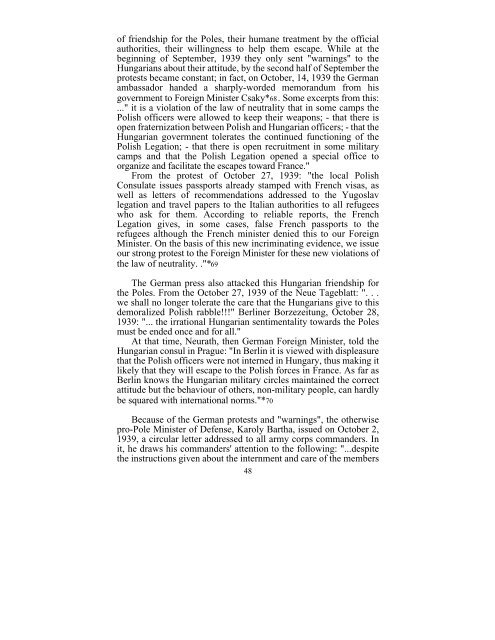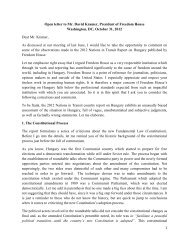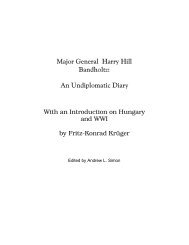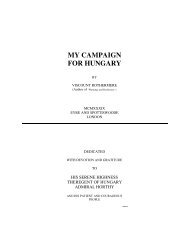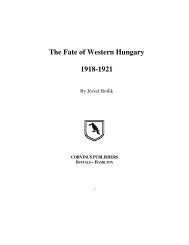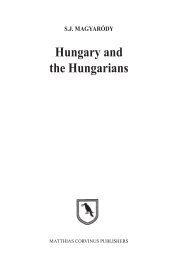the text - Corvinus Library - Hungarian History
the text - Corvinus Library - Hungarian History
the text - Corvinus Library - Hungarian History
You also want an ePaper? Increase the reach of your titles
YUMPU automatically turns print PDFs into web optimized ePapers that Google loves.
of friendship for <strong>the</strong> Poles, <strong>the</strong>ir humane treatment by <strong>the</strong> official<br />
authorities, <strong>the</strong>ir willingness to help <strong>the</strong>m escape. While at <strong>the</strong><br />
beginning of September, 1939 <strong>the</strong>y only sent "warnings" to <strong>the</strong><br />
<strong>Hungarian</strong>s about <strong>the</strong>ir attitude, by <strong>the</strong> second half of September <strong>the</strong><br />
protests became constant; in fact, on October, 14, 1939 <strong>the</strong> German<br />
ambassador handed a sharply-worded memorandum from his<br />
government to Foreign Minister Csaky*68. Some excerpts from this:<br />
..." it is a violation of <strong>the</strong> law of neutrality that in some camps <strong>the</strong><br />
Polish officers were allowed to keep <strong>the</strong>ir weapons; - that <strong>the</strong>re is<br />
open fraternization between Polish and <strong>Hungarian</strong> officers; - that <strong>the</strong><br />
<strong>Hungarian</strong> govermnent tolerates <strong>the</strong> continued functioning of <strong>the</strong><br />
Polish Legation; - that <strong>the</strong>re is open recruitment in some military<br />
camps and that <strong>the</strong> Polish Legation opened a special office to<br />
organize and facilitate <strong>the</strong> escapes toward France."<br />
From <strong>the</strong> protest of October 27, 1939: "<strong>the</strong> local Polish<br />
Consulate issues passports already stamped with French visas, as<br />
well as letters of recommendations addressed to <strong>the</strong> Yugoslav<br />
legation and travel papers to <strong>the</strong> Italian authorities to all refugees<br />
who ask for <strong>the</strong>m. According to reliable reports, <strong>the</strong> French<br />
Legation gives, in some cases, false French passports to <strong>the</strong><br />
refugees although <strong>the</strong> French minister denied this to our Foreign<br />
Minister. On <strong>the</strong> basis of this new incriminating evidence, we issue<br />
our strong protest to <strong>the</strong> Foreign Minister for <strong>the</strong>se new violations of<br />
<strong>the</strong> law of neutrality. ."*69<br />
The German press also attacked this <strong>Hungarian</strong> friendship for<br />
<strong>the</strong> Poles. From <strong>the</strong> October 27, 1939 of <strong>the</strong> Neue Tageblatt: ". . .<br />
we shall no longer tolerate <strong>the</strong> care that <strong>the</strong> <strong>Hungarian</strong>s give to this<br />
demoralized Polish rabble!!!" Berliner Borzezeitung, October 28,<br />
1939: "... <strong>the</strong> irrational <strong>Hungarian</strong> sentimentality towards <strong>the</strong> Poles<br />
must be ended once and for all."<br />
At that time, Neurath, <strong>the</strong>n German Foreign Minister, told <strong>the</strong><br />
<strong>Hungarian</strong> consul in Prague: "In Berlin it is viewed with displeasure<br />
that <strong>the</strong> Polish officers were not interned in Hungary, thus making it<br />
likely that <strong>the</strong>y will escape to <strong>the</strong> Polish forces in France. As far as<br />
Berlin knows <strong>the</strong> <strong>Hungarian</strong> military circles maintained <strong>the</strong> correct<br />
attitude but <strong>the</strong> behaviour of o<strong>the</strong>rs, non-military people, can hardly<br />
be squared with international norms."*70<br />
Because of <strong>the</strong> German protests and "warnings", <strong>the</strong> o<strong>the</strong>rwise<br />
pro-Pole Minister of Defense, Karoly Bartha, issued on October 2,<br />
1939, a circular letter addressed to all army corps commanders. In<br />
it, he draws his commanders' attention to <strong>the</strong> following: "...despite<br />
<strong>the</strong> instructions given about <strong>the</strong> internment and care of <strong>the</strong> members<br />
48


